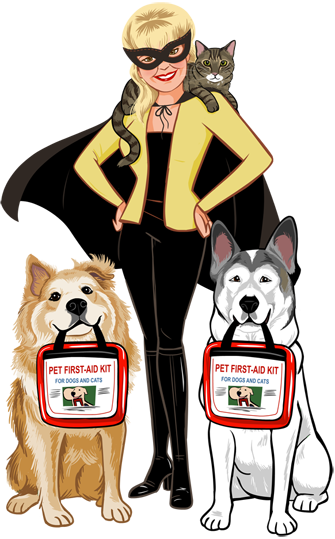
Addressing Age-Related Health Concerns For Senior Pets
Similar to humans, pets face unique health challenges as they get older. Senior or geriatric pets may
require unique medical treatment and care to help them address the effects of aging.
Common Age-Related Health Issues in Pets
Cats and dogs are considered to be seniors once they hit around seven years of age. This varies slightly
based on their size and breed. Smaller dogs age a lot slower than larger breeds. Whether you have a
Maltese or a Great Dane, these are some common issues aging pets face.
Kidney Issues
In both dogs and cats, kidneys balance the body's nutrients and filter out waste. Kidneys are essential to
red blood cell production, controlling blood pressure, and helping pets metabolize calcium. Impaired
kidney function in pets can have a domino effect on their health.
Acute kidney problems can happen when pets ingest toxins like household cleaners, antifreeze, or bad
food. Problems can also arise due to urinary obstructions in your pet's body. Severe dehydration,
heatstroke, and snakebites are common culprits of kidney issues.
Chronic kidney issues are common in older pets. However, the exact cause is difficult to pinpoint
because it has a slow onset. In fact, many pet owners accidentally overlook or ignore the symptoms of
kidney disease in their pets because they are initially mild. Signs of kidney disease in pets include:
• Increased or decreased water consumption
• A change in urinary frequency and volume
• Vomiting or diarrhea
• Blood in the urine
• Signs of dental disease
Heart Problems
Older cats and dogs frequently deal with heart disease. For cats, cardiomyopathy is a common disease
affecting the heart muscle. Dogs commonly deal with congestive heart failure, which affects blood
pumping. Some symptoms that your pet is dealing with heart disease include:
• Difficulty breathing
• Weakness
• Coughing
• Vomiting
Cognitive Dysfunction
Cognitive dysfunction in senior pets describes age-related changes in their ability to understand things in
the world around them. Cognitive changes can happen on their own, or they may develop in conjunction
with other medical disorders.
The acronym DISHAA is used when describing the signs typically associated with cognitive dysfunction.
These include disorientation, interactions, sleep-wake cycle changes, house soiling, activity level
changes, and anxiety.
Some studies have shown that dogs between the ages of 11 and 12 start to exhibit some signs of
DISHAA. After seven years of age, dogs do not learn as quickly, and they may not remember as well.
Additionally, cat owners have been reported to see signs of cognitive decline in their pets between the
ages of 11 and 15 years of age. Treatment options for reversing or slowing down cognitive dysfunction
are more effective the earlier they are detected.
Joint Problems
Osteoarthritis is a key cause of joint pain in pets. Proper nutrition and treatment can minimize pain or
slow down its progression. Unfortunately, there is no cure for osteoarthritis in pets. Part of some of the
symptoms can include limping, avoiding stairs, difficulty walking or standing, or showing pain when
picked up. You may notice that your pet licks or chews the aching joint and is irritable. A veterinarian
may be able to provide you with some options about the best treatment to keep your pet feeling
comfortable.
How to Ensure Your Pet Is Comfortable While Dealing With Health
Concerns
It can be sad to watch as your favorite pet shows signs of aging. Maybe your favorite cat is not spending
as much time on her favorite perch. Or you might notice that your dog is having a hard time getting
around the house. As a pet owner, you can do some things to make your pet's golden years as
comfortable as possible.
Make Things Easily Accessible
Lack of appetite, inappropriate elimination, and behavioral changes in older pets are likely linked to
pain. You can alleviate some of this by making your home easily accessible to your pets. Offer your cat a
low-sided litter box that is easier on his joints. If your dog’s favorite bed is located on the second story,
why not put it downstairs so he does not have to walk upstairs? A veterinarian can help narrow down
the problem and develop a treatment plan.
Provide Extra Padding
A hard floor may have been the ideal sleeping spot for your cat when she was young. Now that she’s
older, dealing with chronic pain, and likely having difficulty regulating her body temperature, she will
need bedding that provides support for her aging body and keeps her warm. Create a cozy place for your
pet by putting the bed in a sunny area and adding a few blankets or even a heating pad set on the
lowest setting.
Get Rid of Obstacles
If your pet is dealing with vision or hearing loss, navigating even familiar spaces can be a challenge.
Make things easier for your pet by removing obstacles and keeping things in the same spot as much as
possible. Clear away clutter, add extra light, and block off hazardous areas like stairs to keep your pet
safe.
Keep Your Pet Healthy
As a pet owner, you want to be mindful of ways that you can maximize your pet's ability to enjoy life
during their golden years.
One of the most important things to keep a senior pet healthy is to take them to regular vet visits. Vet
visits and tests let you catch health issues before they become chronic.
It’s important to check your pet's body regularly for bumps, lumps, and other changes between visits.
Get this checked out as soon as you notice them. Pet insurance can be a great tool to help offset some
of the expenses you may incur as you ensure that your pet has a quality life.
Be on the lookout for changes in your pet's behavior or pain. This includes limping, unwillingness to play,
changes in bathroom habits, fatigue, vomiting, diarrhea, or repetitive behaviors.
Switch to an age-appropriate pet food. Senior pets have different nutritional needs than younger ones.
This includes food that is easier to digest, a decrease in calories, and different nutrients to help them
age well.
Help Your Pets Keep Living the Best Life Ever
Although the changes your pet faces during their senior years can feel overwhelming, small changes in
exercise, food, and environment can make a major difference in their quality and length of life. Ensure
that you get them to the vet regularly, and talk to your veterinarian about how you can help your pet
live out their golden years in a happy and quality way.








